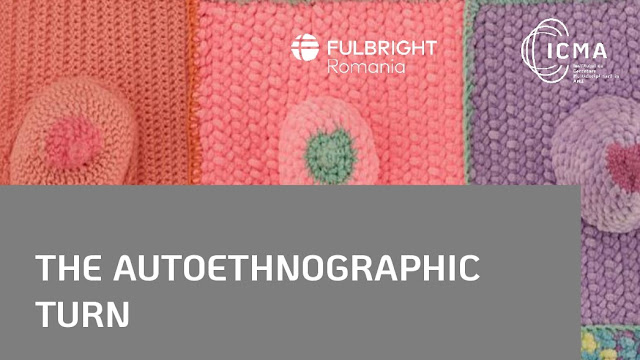ICMA talk on the Autoethnographic turn, a recent concept in art theory that “rely on personal/subjective while conducting research or making art”
June 09, 2022 | Cosmina Marcela OLTEAN ArtPageICMA Institute for Multidisciplinary Research of UNAGE Iasi organized on Thursday, June 2nd, a discussion between art historian Mirela Tanta (Millikin University, USA) and visual artist Smaranda Ursuleanu (Iasi, RO), event moderated by Cristian Nae.
The main questions that were answered during the meeting were “What is autoethnography and how are present-day artists, curators, social scientists, and art historians using autoethnography in their research and artistic practices?” Autoethnography, a recent concept debated by todays art theory, is defined as “an approach to research and writing that seeks to describe and systematically analyze personal experience in order to understand cultural experience.” (Carolyn Ellis, Tony E. Adams &, Arthur P. Bochner, Autoethnography: An Overview, 2010).
“In other words, doing autoethnography means to rely on personal/subjective while conducting research or making art. It is also a phenomenological quest which brings the body and its unique, and therefore personal, experiences to the forefront of research. Autoethnography allows for multiple voices and challenges the myth of objectivity or truth with capital T. Instead, it affirms that the ability to understand the other is conditioned by our willingness to understand ourselves”, pointed out assoc.prof. Cristian Nae, art critic.
”Mirela Tanta’s interest in autoethnography in art history seeks to connect the personal story to the official history. She invites artists to consider the following questions/statements as a starting point for talking about their own artistic practice and research methods: Why now? Why is autoethnography such a recent method? Are there any limitations when using autoethnography?
Autoethnography also means “relational ethics” (researchers do not exist in a vacuum). Is autoethnography solution for a crisis of representation? Is this possible, to have research that is rigorous and emotional?”, he added.
The discussion took place at the Faculty of Visual Arts and Design of UNAGE Iasi and was broadcasted on Microsoft Teams and live on the Facebook page of ICMA.
The art historian
Mirela Tanta is currently a Fulbright Scholar researching contemporary artistic and curatorial practices addressing women’s reproductive rights in Romania. She is an Associate Professor of Art History at Millikin University. Dr. Tanta completed her Ph.D. at the University of Illinois at Chicago (UIC) with a focus in Modern and Contemporary Art, Socialist Realism, and Gender Studies. Prior to Millikin, she taught at Loyola University, Columbia College Chicago, North Central College and UIC. Her interest in the ways in which underrepresented, ephemeral, and personal art objects can empower the individual to become a maker of knowledge informs her poetry as well as her research and teaching. She received awards and fellowships from the UI-Chicago (Institute for the Humanities Dissertation Fellowship, The Dean’s Scholar Award), Mellon Foundation (CLIR) (Mellon Fellowships for Dissertation Research in Original Sources) and New York ArtsLink Program (International Writing Program at the University of Iowa).
The artist
Smaranda Ursuleanu (b. 1995) is a graduate of the Faculty of Visual Arts and Design in Iași (UNAGE, specializing in Mural Art). In 2016, she was awarded an Erasmus+ scholarship at Novia University of Applied Sciences, Fine Arts Program (Jakobstad, Finland) and in 2021 at The Royal Danish Academy of Fine Arts, The School of Conceptual and Contextual Practices, Copenhagen (DK). Smaranda renders stereotypes and social taboos concerning identity and sexuality in subversive, usually feminist visual representations, multiplied and transposed in space through various techniques. Selected exhibitions: Lay Me Down Across The Lines, Kunsthalle Bega, Timișoara (2019), Libidoland 2, apARTe Gallery, Iaşi (2019), ppm#4 copy art show, Aici Acolo Pop up Gallery, Cluj-Napoca (2019), Soon this body will be still, MATCA Art Space, Cluj-Napoca (2019) Common Space - Images, Stories, Voices, Art Encounters Foundation, ISHO House, Timișoara (2018), Where do we go from here?, Salonul de Proiecte, Bucharest (2018), Art Encounters Biennial. Life A User’s Manual 2nd edition, 2017, Timișoara (2017).
About ICMA
ICMA acts as a catalyst for advanced knowledge and artistic experimentation promoting intersectional research in the history and theory of visual arts, music and performing arts, as well as in the field of artistic research.
The Institute for Multidisciplinary Research in Art (ICMA) encourages the analysis of the forms and practices of artistic knowledge developed in modern and contemporary art, and in a broader sense, in contemporary culture and society. ICMA conducts research projects in partnership with institutions of higher education, of research and development, as well as with other institutions that produce and promote artistic events.
ICMA also seeks to contribute to the intellectual dynamics of the University by organizing conferences, seminars, exhibitions, publications, workshops and performance events. Constituting a separate department within the George Enescu National University of the Arts, ICMA therefore acts as a link between the Research Centers and the existing Doctoral Schools within the institution.





0 Comments